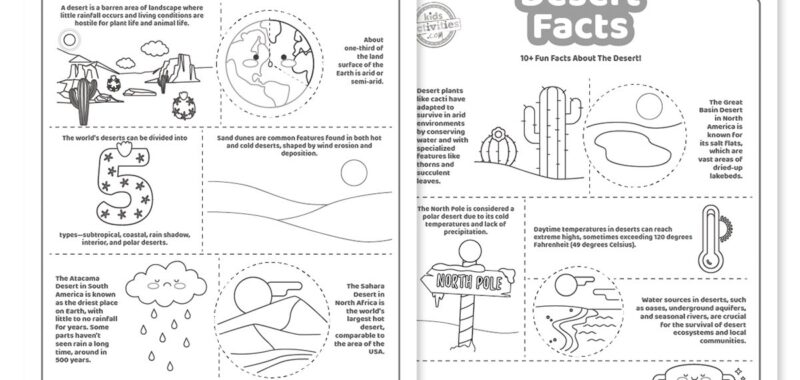Hot deserts, dry deserts, subtropical deserts… There are so many different types of deserts, all with different temperature extremes and a variety of plants and animals, but we can all agree they are some of the hottest places on Earth! Let’s learn some interesting facts about the desert today.
Download here:

Okay. We all know that a desert is a place with little water, high temperatures, and even harsh conditions. When you think about desert areas, you probably think about South Africa or Mexico. But deserts can also have really cool nights and exist in polar regions! And did you know about the existence of kangaroo rats – common desert animals in North America? They are adorable!
Let’s continue learning about deserts today. So print your coloring pages and let’s get started!
Fun Facts about the Desert FOR KIDS
- A desert is a barren area of landscape where little rainfall occurs and living conditions are hostile for plant life and animal life.
- About one-third of the land surface of the Earth is arid or semi-arid.
- The world’s deserts can be divided into 5 types – subtropical, coastal, rain shadow, interior, and polar deserts.
- Sand dunes are common features found in both hot and cold deserts, shaped by wind erosion and deposition.
- The Atacama Desert in South America is known as the driest place on Earth, with little to no rainfall for years. Some parts haven’t seen rain for a long time, around 500 years.
- The Sahara Desert in North Africa is the world’s largest hot desert, comparable to the area of the USA.

- Desert plants like cacti have adapted to survive in arid environments by conserving water and with specialized features like thorns and succulent leaves.
- The Great Basin Desert in North America is known for its salt flats, which are vast areas of dried-up lakebeds.
- The North Pole is considered a polar desert due to its cold temperatures and lack of precipitation.
- Daytime temperatures in deserts can reach extreme highs, sometimes exceeding 120 degrees Fahrenheit (49 degrees Celsius).
- Water sources in deserts, such as oases, underground aquifers, and seasonal rivers, are crucial for the survival of desert ecosystems and local communities.
- The Antarctic polar desert, which makes up the vast majority of Antarctica, is the world’s largest desert.
SUPPLIES NEEDED FOR FACTS ABOUT THE DESERT COLORING SHEETS
Facts about the Desert coloring pages are sized for standard letter printer paper dimensions – 8.5 x 11 inches.

This pdf file includes two coloring sheets loaded with Facts about the Desert that you don’t want to miss. Print as many sets as needed and give them to friends or family!
DOWNLOAD PRINTABLE Facts about the Desert PDF FILE
MORE FUN FACTS COLORING PAGES FROM KIDS ACTIVITIES BLOG
What was your favorite fact about the desert to learn today?

